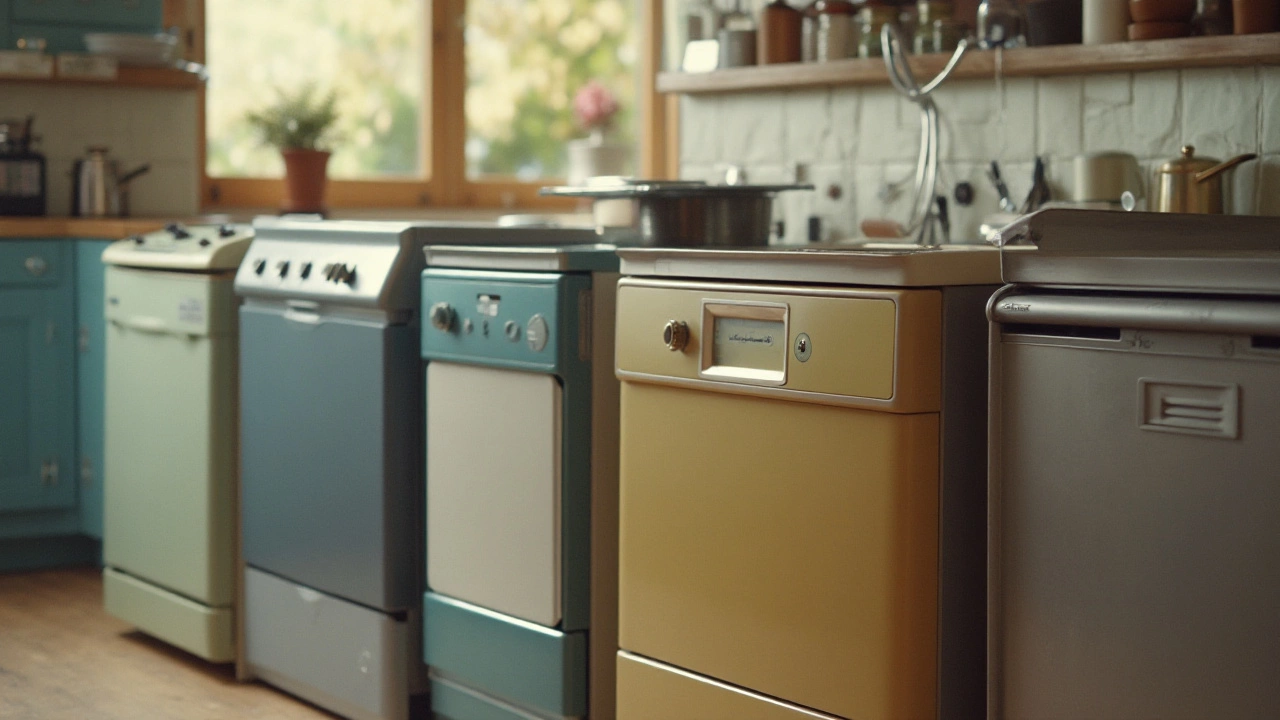Dishwashers, those trusty workhorses of the modern kitchen, typically lead lives of quiet determination. But how long should you expect yours to serve its purpose efficiently? The lifespan of a dishwasher is a topic worth diving into, especially if you’re keen on avoiding unexpected hiccups and expenses.
Most dishwashers hang around for about a decade, but this can vary quite a bit. Understanding what affects a dishwasher’s longevity can help you get the most out of your investment. Factors like usage habits, maintenance routines, and even the model itself play significant roles.
Delving into these will not only answer some burning questions you might have but will also arm you with the knowledge needed for those moments when repairs or replacements creep into the picture. Let’s explore what it takes to keep these essential appliances operating smoothly for as long as possible.
- Average Lifespan of a Dishwasher
- Factors Affecting Longevity
- Maintenance Tips for a Longer Life
- Common Issues and Repairs
- Signs You Need a New Dishwasher
- Eco-Friendly Considerations
Average Lifespan of a Dishwasher
When it comes to the lifespan of a dishwasher, one might be pleased—and perhaps just a bit surprised—to learn that these appliances don’t just bow out after a few years. Typically, dishwashers are built to stick around for about 9 to 12 years. This figure isn't just pulled from thin air; rather, it's backed by studies on appliance durability and consumer usage. Of course, the lifespan can swing widely depending on everything from the model of the machine to how it’s treated in day-to-day use. Brand reputation plays a significant part as well. Manufacturers like Bosch, Whirlpool, and KitchenAid often top lists of longevity, reflecting a blend of robust engineering and user trust.
Model types also contribute to lifespan variations. A high-end, professionally installed dishwasher may outlast its lower-tier cousins by several years. There are quite a few other factors that can push that lifespan one way or the other, too. The frequency of use is often the first influencing factor. A busy family home where the dishwasher runs once or even twice daily is surely going to put more wear on the machine than a single individual's kitchen where it's used thrice a week. Then there's the matter of maintenance routines—or the lack thereof. Regular upkeep, like cleaning the filter and ensuring the spray arms aren’t clogged, can significantly extend the life of your machine.
According to the Appliance Standards Awareness Project, "the lifespan of a dishwasher varies significantly depending on usage patterns and maintenance." It is often observed that when properly cared for, everything about the dishwasher just seems to chug along without much drama, squeezing every bit of its designed life and maybe even a stretch more.
And then there is the question of repair versus replacement. As dishwashers near the end of their expected lifespan, even the most reliable names can face mechanical failures. The part that's critical is deciding when it’s time to repair and when a total replacement is better. This decision often depends on the problem's severity and how much more life can be expected. Typically, spending more than half the cost of a new machine on a repair is rarely advisable.
For those looking to eke out maximum value from their dishwashers, attention should be paid to not just the visible elements like racks and doors but also the inner components—the motor, valves, and heating elements. Ensuring these parts are in good working order can sometimes mean consulting with a professional to get a thorough assessment. So next time you glance at your trusty, humming companion, take a moment to run a few mental math calculations and consider just how long it's been loyally cleaning up life's messes—and how many more years of service might be left.
Factors Affecting Longevity
When considering just how long your dishwasher will last, it’s essential to look at the everyday habits and factors that can have a significant impact. The life of a dishwasher is certainly not fixed in stone, and a variety of elements contribute to whether your appliance remains a reliable kitchen partner or turns into a cumbersome hassle.
One of the major factors is how frequently you run the dishwasher. High-frequency use can naturally lead to more wear and tear. While these machines can handle frequent loads, the moving parts and electronic components will degrade faster compared to those operated occasionally. If you’re running the dishwasher multiple times each day, you might be shaving years off its lifespan.
Quality of water is another critical aspect. Hard water, rich in minerals like calcium and magnesium, can be particularly detrimental. These minerals can accumulate and cause blockages or lead to scaly build-ups inside the dishwasher’s components, affecting its efficiency. Installing a water softener can alleviate some of these issues and extend your appliance’s life.
The U.S. Geological Survey notes, "85% of American homes have hard water." This means that choosing to address water quality is not just a one-off decision but a routine concern for many households.
Maintenance, or the lack thereof, is a factor that cannot be overlooked. Routine cleaning of the dishwasher, including the filter and spray arms, plays a pivotal role. Clogged dishwashers have to work harder, causing them to wear out more quickly. Simple tasks like wiping down door gaskets and ensuring food scraps don’t enter the washer also help maintain its sanitation levels.
More Factors at Play
The machine’s make and model are undeniably important. Higher-end models are often designed with longevity in mind, featuring durable components and advanced technologies that allow them to withstand the rigors of daily use. However, this doesn’t automatically mean that budget options are destined for short lives. Choosing wisely based on consumer reviews and product reliability reports can make a big difference. There’s a common belief that older dishwashers last longer due to their simpler mechanics, but with advances in technology, newer models are now built with durability and efficiency at heart.The installation process also counts. An improperly installed dishwasher may suffer from leaks which can lead to water damage not just in the dishwasher but to your countertops and floor. It's advisable to get a professional installation to circumvent these risks.
Environmental Elements and Usage Habits
Many people don't think about how external environment can influence an appliance. Hot, humid climates potentially result in mold and mildew accumulation within the dishwasher, while extremely cold environments might cause pipes to freeze. Moreover, how you load the dishwasher can be a factor too. Improper loading can cause physical damage to racks and spray arms over time. Surprisingly, not running a dishwasher enough can be problematic too. Long periods of disuse might cause the seals to dry out, leading to leaks when it is eventually used.By understanding and managing these factors, homeowners can be better prepared to care for their dishwashers, ensuring they stand the test of time while keeping their kitchen operations smooth and efficient.

Maintenance Tips for a Longer Life
Taking care of your dishwasher can significantly extend its lifespan and keep it running efficiently. A little regular maintenance goes a long way, and it's simpler than you might think. Start with routine cleaning, which prevents buildup and blockages that can lead to larger, more costly issues. Cleaning the filter is crucial as it traps bits of food and debris. If left unattended, these tiny particles can clog the inner workings of your appliance, decreasing its performance. For a deeper cleanse, many users swear by a mixture of vinegar and baking soda. This combination can be a gentle yet powerful remedy to combat mineral deposits and any lingering food odors.
Another key to preserving the life of your machine is using the right detergent. It’s important not to overdo it with the soap, which can create excess suds that may harm internal components. High-efficiency dishwashers are designed to work well with specific detergents that are formulated to clean effectively without waste. Periodically checking the spray arms is equally essential. Over time, spray arm nozzles may become blocked, leading to water not circulating effectively. Clear these by gently removing and rinsing them, ensuring everything flows smoothly.
Inspecting and maintaining the door seals can prevent disastrous leaks. When these seals are kept clean and intact, water stays where it should – inside the dishwasher. Wipe down the gasket regularly because food and grime can build up, causing corrosion and breakage. Don't underestimate the importance of managing the salt and rinse aid levels, which play a huge role in cleaning power and preventing limescale, especially in areas with hard water. To ensure everything's working properly, frequently run the rinse cycle on an empty machine with a dishwasher cleaner. This step helps dissolve greasy residues and maintains a sparkling finish.
As kitchen appliance expert Jane Johnson notes, "Regular attention to small maintenance tasks not only enhances performance but can also prevent big problems down the line."
Don’t ignore strange sounds or issues when the machine is running. Unusual noises or inefficient cleaning performance are often first signs something may need attention. Address these quickly by referring to the manufacturer's guidelines or consulting a professional if you suspect something beyond your DIY skills. Remember, timely intervention can prevent minor issues from snowballing into major repairs. Enabling a preventative maintenance mindset can help you get the most from your kitchen appliances and ensure your dishwasher reliably beats the average lifespan of just 10 years.
Common Issues and Repairs
In the daily hustle of modern life, dishwashers provide a much-needed breather from kitchen duties. However, these kitchen appliances are not without their woes. One common headache among users is when the dishwasher leaves dishes less than sparkling. This issue often roots back to clogged spray arms or a malfunctioning filter. To troubleshoot, first remove the spray arms and check their holes for any debris. While a gentle cleaning usually suffices, consider giving your machine a deeper clean by running it empty with a cup of vinegar to dissolve pesky soap scum and hard water deposits.
Another frequent problem haunting dishwashers is strange noises during operation. If your once silent home maintenance companion starts resembling a rusty old rumbler, it might be time to inspect the motor. Often, foreign objects getting caught can produce such sounds. In some cases, however, the motor could be wearing out and may need a professional eye. A good habit is to regularly check for any loose items or utensil parts that might find their way into awkward spots. Maintaining a calm ear on your machine will pay off when avoiding costly repairs down the line.
Water not draining properly is an equally dreaded issue. It's all too common to open the door at the end of a cycle, only to find a soggy disaster. This could signal an obstruction in the drain hose or an issue with the drain pump. Most blockages can be resolved by removing and cleaning the filters and checking the hose for kinks or obstructions. It’s these little detective missions that ensure your dishwasher stays in top form, washing away the grime day after day.
Timing is everything, and this applies to dishwashers too. Suppose you find your appliance taking an age to complete a cycle. Then, the culprit might be the thermostat, which is responsible for regulating the water temperature. Constant use and wear can cause this component to falter, impacting efficiency. To tackle this, ensure you regularly clean out your dishwasher and check that nothing is obstructing the flow of water, giving your trustworthy machine the best shot at a speedy recovery.
For those diving deep into dishwasher repair, familiarizing yourself with error codes can be a game-changer. Many modern dishwashers are equipped with self-diagnostic utilities that flash error codes, signaling issues ranging from door latch troubles to circuit malfunctions. On encountering a code, consult your user manual, which often follows with a list of solutions. Knowledge of these codes, in addition to regular maintenance, allows you to effectively prevent small glitches from escalating into larger, costly problems.
Sometimes expert insight is invaluable. According to the Consumer Reports magazine, "Routine maintenance and addressing small repairs promptly can notably extend the lifetime of dishwashers."
The report goes further, emphasizing regular filter checks and cleansing as not just a remedy for existing issues, but a pre-emptive strike against problems lying in wait.Adopting a proactive approach will have you delighting in a spotless clean every time.

Signs You Need a New Dishwasher
As we rely on our trusty dishwashers to handle an arduous task daily, it’s essential to recognize when they might be showing signs of needing replacement. One of the first telltale signs is inefficiency in cleaning dishes. If your plates come out of the wash cycle looking as grimy as when they went in, despite using the right detergent and settings, it might indicate the appliance's internal systems are failing. Persistent soap scum or leftover food particles can mean that the machine's filters, pumps, or spray arms no longer perform as they should.
Another common sign is repeated repair needs. While any appliance can benefit from a timely fix, if your dishwasher frequently demands professional attention, it might not be affordable, or practical, in the long run. Constant breakdowns, unusual noises, or stoppages during washes could mean vital components like the motor or electrical circuits are on their last legs. As noted by Ryan Barker, an appliance repair expert,
“Investing in repeated repairs often just delays the inevitable need for a new, more efficient model.”
Leakage is a glaring hint that something isn’t quite right. Small puddles around your kitchen floor, whenever the machine runs, spell trouble. Not only can they indicate damage to seals and hoses, but these leaks can lead to bigger headaches, such as water damage to floors and cabinetry. If tightening or replacing seals don't solve the problem, a new dishwasher might be the best solution. The age of the appliance is, of course, another factor. Most models last around 10-12 years, so if you've been using the same machine for over a decade without significant issues, consider yourself lucky and start shopping for a replacement before the small problems begin.
Listening to your kitchen appliances is as crucial as observing them. A sudden grind or high-pitched whine might require immediate attention. Such unsettling noises often stem from malfunctioning parts or foreign objects in the circulation path. If the noise persists post-inspection and problem-solving attempts, an out-of-tune dishwasher could signal it's nearing the end of its cycle. Moisture on the exterior door is also a subtle sign. It suggests potential inefficiencies in the machine's dry cycle or door seals, usually noticeable when these components start breaking down due to aging material.
In addition, modern technology has evolved, and new dishwashers offer energy efficiency and quieter operation, making them a more appealing option. An eco-friendly home maintenance approach might incentivize upgrading to reduce energy bills and environmental impact. Evaluating the cost of keeping the old one against the efficiency and features of newer models is essential in making a well-informed decision. Ultimately, as with most kitchen appliances, proactive observations and comparing performance with your kitchen's demands can ensure a smooth transition to a new dishwasher.
Eco-Friendly Considerations
As the world tilts towards sustainable living, understanding the eco-friendly impacts of our home appliances, such as dishwashers, becomes vital. In terms of energy consumption and water usage, modern dishwashers have improved significantly. They are designed to use less water than washing dishes by hand, which is fascinating if you consider that every drop counts. Typically, an Energy Star-rated dishwasher uses about three gallons of water per cycle, far lower than the twenty-seven gallons used in a manual wash session.
When contemplating an eco-friendly choice, it’s essential to examine not just the appliance’s efficiency but also its lifecycle - how long it lasts and what happens after its disposal. The production process of a dishwasher, while energy-intensive, can be justified if the appliance offers a lengthy service life, minimizing the need for replacements. However, manufacturers are constantly seeking ways to incorporate recycled materials, directly impacting resource conservation.
Additionally, pay attention to the type of detergents used. Eco-conscious consumers might lean towards biodegradable options that are free of phosphates and chlorine, key chemicals that affect not only the longevity of the machine but also the health of our waterways. These eco-friendly detergents can help in extending the machine's lifespan by reducing build-up and clogs.
"One of the greenest things we can do is make our appliances last longer," says Tanya Ha, an environmental campaigner, underscoring the importance of durability in reducing environmental impact.
When selecting a dishwasher, it’s wise to seek models that incorporate features like high-efficiency motors and improved insulation to retain heat. Innovations like soil-sensing technology adjust water use, adapting to the actual dirtiness of each load, hence conserving resources effectively. Maintaining your dishwasher by regularly cleaning filters and seals, as well as performing periodic checks, assures that it runs at peak efficiency, making a greener impact in the long run.
End of Life and Recycling
Thinking about the end of a dishwasher’s life might not be at the forefront when purchasing, but it remains crucial. Many components can and should be recycled, keeping valuable materials out of landfills. Manufacturers and big-box stores may offer take-back programs that ensure old dishwashers are disposed of responsibly, often at no extra cost to the consumer. Old machines can be dismantled, and parts repurposed in new appliances, thus closing the loop on the appliance life cycle.
In stepping towards a sustainable future, considering the eco-friendly facets of your kitchen appliances is not just a trend but a necessity. It requires a balanced view of consumption, maintenance, and disposal, ensuring that each step contributes positively to our planet's well-being. Armed with these insights, one can make informed decisions that extend beyond their kitchen’s walls.

